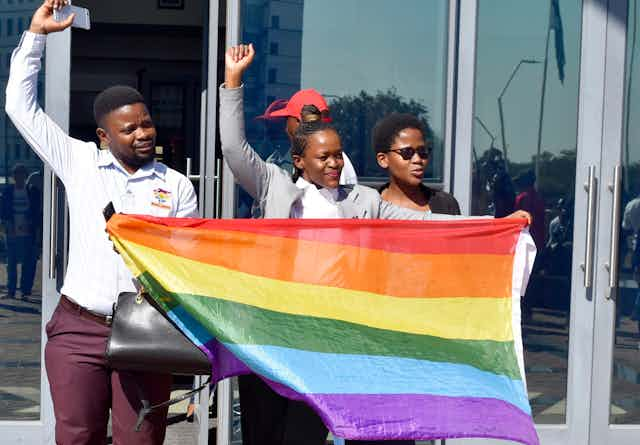Botswana is a small country by population, but a big one by its role in the history of multi-party democracy and human rights in southern Africa. Botswana, although it did not sacrifice as much as many of the other frontline states, just got bigger. Last month, its High Court determined that the law that criminalised “carnal knowledge of any person against the order of nature” was discriminatory and therefore unconstitutional.
Botswana now joins a select group of African countries that recognizes the rights and dignity of its sexual minorities.
This ruling is a tremendous victory for all LGBTQ people in Botswana. The path is now open to liberate LGBTQ people from fear of arrest and harassment by the police, of shaming and outing by health-care professionals and of extortion by ex-lovers, among other presently common experiences.
Read more: Botswana court ruling is a ray of hope for LGBT people across Africa
It has the potential to liberate LGBTQ people psychologically from the stigma of being criminalized. That stigma often drove men who have sex with men (MSM) to hide their sexuality behind a façade of heterosexual relationships. This ruling provides some hope for a safer and greater dignity as the need to hide from the law is removed.
The ruling has significance far beyond Botswana’s borders.
Botswana is widely respected
Although human rights monitors in South Africa have reported failures by security forces to uphold rights of lesbians and transgender men, it was the first country in the world to enshrine freedom from discrimination on the basis of sexual orientation in its national constitution. It was also one of the first governments in the world to recognize full equality of marriage for sexual and gender minorities.
While Cape Town markets itself as “Africa’s gay capital,” South Africa has been cautious to avoid the accusation of exporting its approach to human rights. Some consider the South African laws an idiosyncrasy linked to white settler colonialism.
But Botswana was never a colony. It was a protectorate in which core aspects of traditional authority and culture were preserved and almost no white settlement was allowed. Botswana, Angola, Mozambique and Zimbabwe are widely respected throughout Africa for their role in the liberation of South Africa from white supremacy.
The Botswana ruling may slightly embolden South African’s Minister of International Affairs. Now that South Africa is just one of four nations in the region to have decriminalized consenting homosexual acts, it may become more forthright in speaking out against gross violations of the human rights of sexual and gender minorities in other African countries.

Urbanized and progressive
The common assumption is that traditional culture in Botswana is inimical to gay rights. That assumption is mistaken.
Botswana is one of the most urbanized countries on the continent (more so than South Africa, and not much behind Switzerland). LEGABIBO (Lesbians, Gays, Bisexuals of Botswana, whose CEO testified as a friend of the court in this case), is one of the oldest sexual minority rights associations on the continent outside of South Africa.
While Sotho-Tswana remain strong and integral to national identity, traditional culture is actually more open than commonly assumed. The concept of batho (often translated as “African humanism”) is perhaps relevant to that understanding. How can you be a human being with dignity and meaning if you do not respect your fellow humans — alive, yet-born and ancestral — as equally endowed with dignity and humanness, notwithstanding their (and our own) many differences and flaws? The current president appears to share the same view.
Former president Festus Mogae hinted at this cultural attribute a few years ago when he admitted that, as president, he quietly ordered the police not to enforce the-then law. Why enforce something that humiliates our family members and ourselves, especially when that law is a relic of a colonial, racist system?
Read more: Botswana joins list of African countries reviewing gay rights
Judicial independence
Botswana has a long and proud tradition of judicial independence and of the courts taking a stand against the misuse of power.
The current ruling is actually the culmination of an incremental process of legal victories over the past decade, including winning the rights to non-discrimination in places of employment, change gender identity on official documents and form civil society associations. This process of respect for the rule of law is powerful testimony to the strength of Botswana’s democratic institutions.
But democracy, of course, does not always favour progressive change. Botswana’s Attorney General has already filed an appeal against the new ruling. Although, without providing a strong rationale and running counter to the President’s earlier sympathetic statements toward sexual minorities, it is difficult to see the appeal as much more than a performance of rectitude.

Several African countries have used appeals to democracy to cement majoritarian cultural preference into their constitutions precisely to block sexual minority rights. This was the main argument in the Kenya case, where decriminalization of sodomy theoretically opened the door to a challenge on the constitutional definition of marriage as heterosexual.
In Botswana, a public health crisis clarified that democracy means more than majority preference. Botswana has one of the highest rates of HIV/AIDS prevalence in the world, roughly 100 times that of Canada’s. Botswana was among the first governments on the continent to recognize the imperative of a holistic, science-based approach to fighting the pandemic.
Since men who have sex with men (MSM) and trans people have disproportionately high rates of HIV , it only makes sense to help that “key population” protect itself (and hence the non-key majority, who can now be equipped with honest sexuality education). Rationally, and compassionately, who can oppose this logic on the most basic public health grounds?
Bravo, Botswana, for saying so loudly and clearly that they cannot.
[ You’re smart and curious about the world. So are The Conversation’s authors and editors. You can read us daily by subscribing to our newsletter. ]

